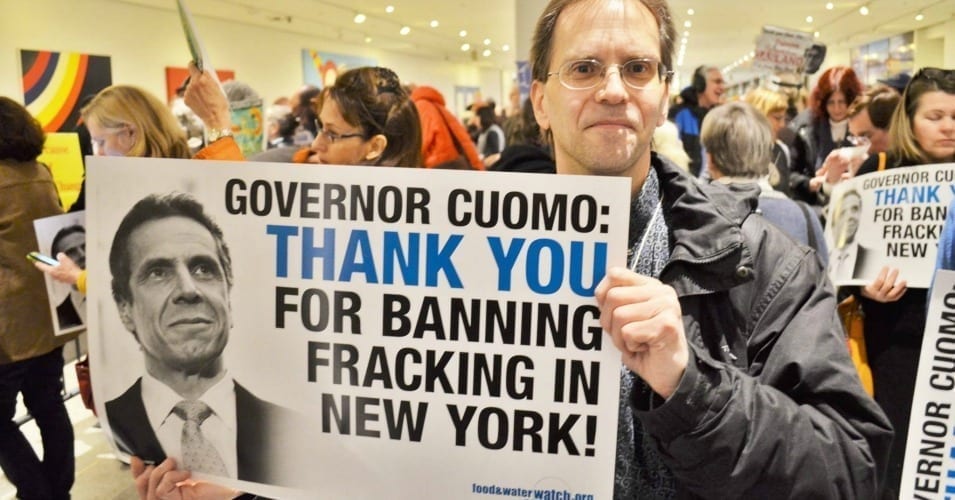6/30/2015

After a nearly seven-year research process, the New York state Department of Environmental Conservation (DEC) released a damning findings statement on hydraulic fracturing, better known as fracking. The statement was the official document needed in order to ban the practice in the state. In a prepared statement, DEC chief, Joe Martens said, “Prohibiting high-volume hydraulic fracturing is the only reasonable alternative. High-volume hydraulic fracturing poses significant adverse impacts to land, air, water, natural resources and potential significant public health impacts that cannot be adequately mitigated. This decision is consistent with DEC’s mission to conserve, improve and protect our state’s natural resources, and to enhance the health, safety and welfare of the people of the state.” Martens announced last December that he would put forth every effort to ban the process in New York, with the DEC releasing a 1,448-page report last month regarding the study that began in 2009. The controversial oil and natural gas extraction method has been linked to seismic activity, although the U.S. Environmental Protection Agency (EPA) recently claimed in a seminal report that the process does not significantly contaminate groundwater supplies to the chagrin of many in opposition.
In the report, the DEC wrote “The Department’s chosen alternative to prohibit high-volume hydraulic fracturing is the best alternative based on the balance between protection of the environment and public health and economic and social considerations.” The movement against fracking gained significant traction in the state, with two environmental groups, New Yorkers Against Fracking and Americans Against Fracking, both campaigning hard for the ban. Additionally, actor and New Yorker, Mark Ruffalo, an Americans Against Fracking board member, also campaigned heavily using his national profile to argue for the ban. Ruffalo made a recent appearance on The Daily Show with Jon Stewart to make the case against the process as well as advocate for 100 percent of energy sources to be renewable by 2050. Ruffalo read a prepared statement in praise of New York Governor Andrew Cuomo and the DEC, saying “Governor Cuomo has set a precedent for the nation by carefully considering the science, which shows a range of public health and environmental harms, and doing what’s best for the people, not the special interests of Big Oil and Gas.”
Fracking bans are beginning to gain momentum at the state and municipal levels. Vermont famously banned fracking in 2012, and Maryland passed a 2 ½ year ban on the process on June 1st. New Jersey has also issued a moratorium on fracking, although not an outright ban. Texas regulators have also put heavy restrictions on the practice near the Dallas-Fort Worth metroplex, as well as in cities such as Denton. Santa Cruz became the first county in California to ban fracking, along with several additional municipalities in the state. Prior to the New York ban, Los Angeles became the largest city in the country with a fracking moratorium. 58 percent of Pennsylvanians support a moratorium on fracking as many in the state dispute the EPA’s findings regarding groundwater. Industry groups have already threatened to challenge the ban, and will likely cite the EPA report as an example of New York’s overzealousness in regulation. Despite the threats, Earthjustice’s managing attorney, Deborah Goldberg, believes the legislation will withstand any legal review. Goldberg announced that the environmental organization will “stand alongside the state in any legal challenge.” Goldberg and Earthjustice won a precedent-setting case a year ago Wednesday for the town of Dryden, New York, banning fracking in the town and essentially starting the cause for statewide prohibition.
The 998-page EPA report released on June 4th contains a mixed-message on hydraulic fracturing. The controversial process is conducted by using high pressure water to create or widen holes in the ground to extract oil-shale and natural gas reserves. The process, along with the discovery of Bakken formation in the Dakotas and Montana, has contributed greatly to the U.S.’s economic recovery since the Great Recession, and has reinstated the country’s pre-eminence as a top global energy producer. With that, as the EPA admitted in its report, there has been a link between a dramatic increase in low-level seismic activity near areas were fracking occurs. Ohio and Texas have been especially plagued by the quakes, with 23 quakes of 2.5 magnitude or higher occurring in North Texas alone in 2015. The EPA’s conclusion, however, that despite some degree of groundwater contamination due to fracking, that it didn’t constitute being labeled as a significant environmental risk. Despite the report’s findings, many residents with water wells, especially in Pennsylvania, have faced many instances of groundwater contamination near areas where fracking has taken place.
Sources:
Daily Caller – Michael Bastasch
Eco Watch – Cole Mellino
Syracuse.com – Glenn Coin


Join the conversation!